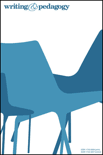
Writing & Pedagogy
Scope & Guideline
Exploring the Nexus of Writing and Teaching
Introduction
Aims and Scopes
- Writing Instruction in Diverse Contexts:
The journal explores writing instruction across different educational settings, including foreign language education, technical writing, and professional writing, emphasizing the need for adaptable pedagogical strategies. - Teacher Cognition and Perspectives:
Research on teachers' beliefs, cognition, and perspectives regarding writing instruction is a core focus, highlighting how these factors influence teaching practices and student outcomes. - Multilingual and Intercultural Writing:
The journal addresses the challenges and strategies in teaching writing to multilingual and diverse student populations, reflecting on the complexities of intercultural communication in writing. - Assessment and Standards in Writing:
A significant area of investigation involves the assessment of writing and the standards used in various writing programs, including the alignment of classroom practices with industry expectations. - Innovative Pedagogical Practices:
The journal encourages the exploration of innovative pedagogical methods and technologies, such as virtual workshops and interactive fiction, to enhance writing instruction and student engagement.
Trending and Emerging
- Impact of Technology on Writing Pedagogy:
Recent publications increasingly focus on the role of technology, such as virtual workshops and screencasting, in enhancing writing instruction and feedback mechanisms. - Civic Discourse and Writing:
There is a growing emphasis on civic engagement and discourse in writing education, highlighting the relevance of writing as a tool for social change and community involvement. - Emotional and Psychological Aspects of Writing:
Emerging research addresses the emotional processes involved in writing, particularly for first-generation college students and those navigating complex educational contexts. - Intersections of Writing and Professional Practices:
There is an increasing trend to bridge the gap between academic writing instruction and professional writing practices, focusing on how classroom experiences can better prepare students for workplace demands. - Multilingual and Inclusive Writing Practices:
The journal is seeing a rise in research that supports multilingual writers and inclusive pedagogies, recognizing the importance of diverse linguistic backgrounds in writing instruction.
Declining or Waning
- Traditional Writing Pedagogies:
There appears to be a decreasing focus on traditional, prescriptive approaches to writing instruction, as newer methodologies that emphasize student agency and engagement gain prominence. - General Writing Skills without Contextualization:
Papers that discuss writing skills in isolation, without considering contextual factors such as genre, audience, or discipline, are becoming less common as the field moves towards more integrated approaches. - Basic Writing Instruction for Homogeneous Student Populations:
Research focusing solely on basic writing instruction for students from homogeneous backgrounds is waning, reflecting a shift towards recognizing the diverse needs of multicultural classrooms.
Similar Journals
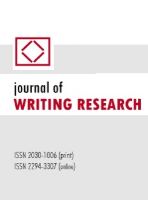
Journal of Writing Research
Exploring the Dynamics of Written ExpressionThe Journal of Writing Research, published by the University of Antwerp, is an esteemed academic journal dedicated to advancing the field of writing research through rigorous scholarship and innovation. With an ISSN of 2030-1006 and E-ISSN 2294-3307, this Open Access journal has been fostering global dialogue and exploration in writing studies since 2008. It resides in the heart of Belgium, reflecting a commitment to multilingualism and diverse writing practices. Recognized for its high impact within the academic community, the Journal holds a Q1 quartile ranking in Education, Linguistics and Language, and Literature and Literary Theory as of 2023, with impressive Scopus ranks placing it in the top tiers of related disciplines. Aiming to bridge theory and practice, this journal serves as a vital resource for scholars, practitioners, and students interested in the intricate dynamics of writing, offering an inclusive platform for the latest research and interdisciplinary discussion. Emphasizing accessibility and engagement, the Journal of Writing Research stands out as an essential outlet for contemporary writing scholarship.
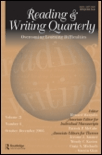
Reading & Writing Quarterly
Illuminating the path to effective literacy instruction.Reading & Writing Quarterly, an esteemed journal published by Routledge Journals, Taylor & Francis Ltd, stands as a pivotal resource in the fields of education and linguistics. Established in 1992, this journal has gained recognition for its rigorous scholarly contributions, reflected in its impressive Q1 ranking in both Education and Linguistics, as well as notable placements in the Scopus rankings (75th and 330th percentiles respectively). With its commitment to advancing research on reading and writing processes, practices, and pedagogy, Reading & Writing Quarterly continues to inform and engage an audience of researchers, educators, and students keen on effective literacy instruction and research. While this journal does not provide open access options, its rich content remains a vital asset for those invested in the evolving landscape of literacy education. Based in the United Kingdom, it is positioned not only as a national treasure but also as a significant contributor to global educational discourse. Explore the insights and research that shape contemporary practices in literacy education through this highly respected publication.
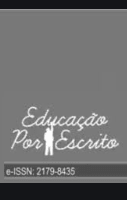
Educacao por Escrito
Cultivating Innovative Approaches to Teaching and WritingEducacao por Escrito is a distinguished academic journal published by EDIPUCRS-EDITORA UNIV PUCRS, focusing on the intersection of education and writing practices. With its open access model established in 2010, the journal aims to democratize access to research and foster global dialogue on educational methodologies, literary analysis, and pedagogical innovations. Although specific metrics such as HIndex and Scopus rankings are pending, the journal is committed to quality scholarship that contributes to the fields of education and linguistics, making it an essential resource for researchers, educators, and students alike. Located in Porto Alegre, Brazil, Educacao por Escrito serves as a platform for diverse voices, aiming to advance understanding and practice in the expansive landscape of educational writing.
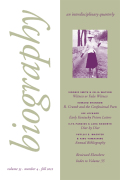
BIOGRAPHY-AN INTERDISCIPLINARY QUARTERLY
Unveiling History Through Individual LivesBIOGRAPHY-AN INTERDISCIPLINARY QUARTERLY is a renowned academic journal published by the University of Hawaii Press, focusing on the interdisciplinary study of biography from a historical perspective. With an ISSN of 0162-4962 and E-ISSN 1529-1456, this journal serves as a pivotal resource for scholars and researchers interested in the multifaceted nature of biography across various disciplines. Since its inception in 1978, Biography has facilitated in-depth exploration and scholarly dialogue, establishing itself in the Q3 quartile for History in 2023, and ranking 835 out of 1760 in the Scopus database for Arts and Humanities. The journal embodies a commitment to enhancing the understanding of personal narratives within historical contexts, making it essential reading for professionals, students, and anyone invested in the crafting and study of individual life stories. Although it is not an open-access journal, it provides critical insights that are invaluable for academic research and discourse.
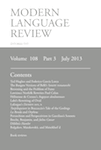
MODERN LANGUAGE REVIEW
Cultivating Knowledge in Linguistic and Literary ContextsMODERN LANGUAGE REVIEW, published by the Modern Humanities Research Association, is a pivotal academic journal based in the United Kingdom, focusing on the fields of linguistics, literature, and literary theory. With an ISSN of 0026-7937 and an E-ISSN of 2222-4319, this journal serves as a platform for disseminating research that explores the nuances of language and its literary contexts. Although currently not an open-access publication, it provides valuable insight into a range of topics, contributing to a deeper understanding of human communication and expression. Covering a wide scope with a publication history from 2002 to 2024, the journal is indexed in Scopus and holds a Q4 ranking in both linguistics and literature categories, indicating its emerging influence within these academic disciplines. As the landscape of humanities research continues to evolve, MODERN LANGUAGE REVIEW remains a vital resource for scholars, professionals, and students aiming to engage with contemporary debates and developments in language and literature.

Educacao & Formacao
Fostering Innovation in Education and TrainingEducacao & Formacao is a pioneering academic journal published by the State University of Ceará within the Centro de Educação, focusing on the fields of education and teacher training. With an E-ISSN of 2448-3583, this journal has embraced the open access model since 2016, ensuring that high-quality research is freely accessible to educators, researchers, and practitioners globally. The journal serves as a vital platform for disseminating innovative research, critical analyses, and best practices in education, particularly within the Brazilian context and beyond. With its commitment to contributing to the discourse on education, Educacao & Formacao encourages submissions that advance knowledge and foster improvements in educational practices. The journal’s focus on accessibility and engagement makes it an invaluable resource for professionals and students eager to stay abreast of current trends and developments in education.
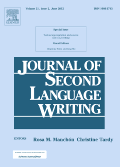
JOURNAL OF SECOND LANGUAGE WRITING
Bridging Theory and Practice in Language EducationJOURNAL OF SECOND LANGUAGE WRITING, an esteemed publication of PERGAMON-ELSEVIER SCIENCE LTD, serves as a pivotal resource in the fields of Education and Linguistics, exhibiting a remarkable impact factor that solidifies its standing in the academic community. Established in 1992, this journal has consistently provided a platform for high-quality research and discourse, with its articles rigorously peer-reviewed to ensure scholarly integrity. Holding Q1 rankings in both Education and Linguistics for 2023, it is recognized for its influence in shaping the field of second language acquisition and pedagogy. With impressive Scopus rankings that place it in the 98th percentile among peers, the journal attracts a diverse readership comprising researchers, educators, and students eager to explore the intricacies of second language writing. Its focus encompasses theoretical research, practical applications, and innovative methodologies that enrich the field, making it an essential resource for those dedicated to understanding and enhancing the writing skills of second language learners.
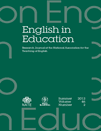
English in Education
Navigating the Evolving Landscape of English EducationEnglish in Education, published by Taylor & Francis Ltd, is a premier journal dedicated to the broad field of education, with a specific focus on the interplay of language, literature, and pedagogy. Since its inception in 1964, this esteemed journal has become a vital resource for researchers, educators, and students alike, offering a platform for innovative research and scholarly discourse. With an impressive impact factor and categorized in the top quartiles of both Linguistics and Language, and Literature and Literary Theory, it ranks among the top journals in its field, denoting its significance and influence. The journal aims to advance understanding and practice in English education through rigorous peer-reviewed articles, theoretical explorations, and empirical studies that address contemporary challenges and developments in these intertwined disciplines. The journal’s commitment to excellence is reflected in its Scopus rankings, highlighting its critical role in fostering research that informs and enriches educational practices. Although currently not open access, English in Education remains an essential outlet for professionals seeking to contribute to the evolving landscape of English language and literature education.
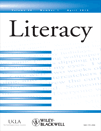
Literacy
Transforming Literacy Research for Tomorrow's EducatorsLiteracy is a premier academic journal published by Wiley, focusing on critical advancements and research in the fields of education and linguistics. With an impressive impact factor reflected in its Q2 ranking in Education and Q1 in Linguistics and Language, this journal serves as a vital platform for researchers, educators, and students seeking to explore contemporary issues surrounding literacy in diverse contexts. Since its inception in 2005, Literacy has made significant contributions to understanding the evolving nature of literacy practices, promoting dialogue on innovative pedagogies and the sociocultural implications of language use. While it is not an Open Access journal, its accessibility through institutional subscriptions ensures that its valuable insights reach a broad audience. With its robust Scopus rankings, including an 88th percentile in Language and Linguistics and 63rd in Education, Literacy remains an indispensable resource for those committed to advancing literacy education and research.

COLLEGE ENGLISH
Exploring the Intersection of Language and PedagogyCOLLEGE ENGLISH, ISSN 0010-0994, is a premier academic journal published by the NATIONAL COUNCIL OF TEACHERS OF ENGLISH that serves as a pivotal platform for the advancement of research and scholarly discussion in the fields of education and linguistics. With a strong focus on the intersection of language and teaching, this journal has established its reputation with notable Scopus rankings, achieving a Q2 category in Education and a Q1 category in Linguistics and Language as of 2023. The journal’s commitment to high-quality research is further evidenced by its placement in the top 20th percentile for Arts and Humanities—Language and Linguistics. By providing a rigorous forum for educators, researchers, and students alike, COLLEGE ENGLISH fosters an environment conducive to innovative ideas and interdisciplinary dialogue, promoting deeper understanding and effective teaching practices. Although it does not provide Open Access options, the journal continues to be an essential resource for those aiming to enhance their academic pursuits in the evolving landscape of language education.